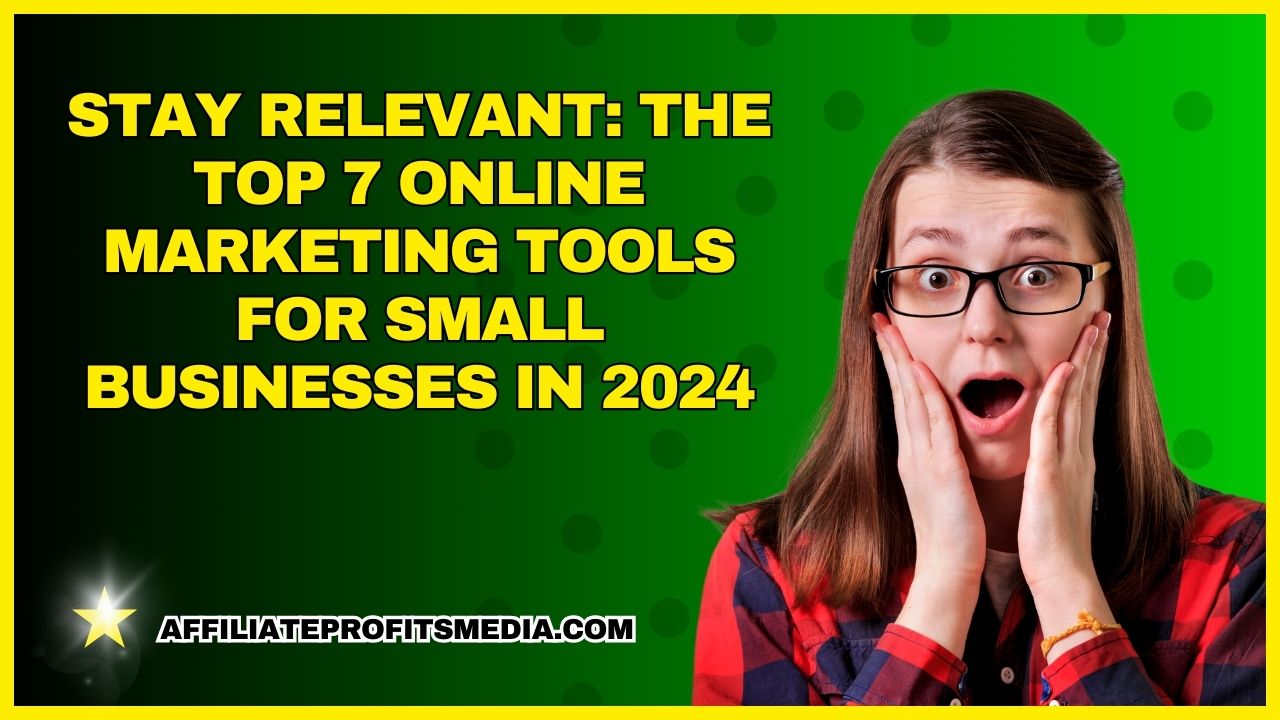In today’s fast-paced digital world, staying relevant is crucial for small businesses to thrive. With the ever-evolving landscape of online marketing, it’s essential to utilize the right tools to reach your target audience effectively. In this article, we’ll explore the top seven online marketing tools that small businesses can leverage to stay ahead in 2024.
>> Here’s the Proven Way to Make $100-$200 Daily with 0 Investment – Watch This FREE Video and Start Now >>

1. Google Ads
Google Ads remains a powerhouse in online advertising, offering small businesses a platform to reach potential customers through targeted ads. With features like keyword targeting, ad extensions, and audience segmentation, Google Ads allows businesses to maximize their online visibility and drive targeted traffic to their websites.
2. Social Media Management Tools
Managing multiple social media platforms can be overwhelming, but with the right tools, it becomes more manageable. Platforms like Hootsuite, Buffer, or Sprout Social allow businesses to schedule posts, analyze performance metrics, and engage with their audience across various social media channels seamlessly.
3. Email Marketing Platforms
Email marketing continues to be one of the most effective ways to nurture leads and retain customers. Tools like Mailchimp, Constant Contact, or HubSpot enable small businesses to create personalized email campaigns, automate workflows, and track the performance of their email marketing efforts.
4. Search Engine Optimization (SEO) Tools
Ranking high on search engine results pages (SERPs) is crucial for driving organic traffic to your website. SEO tools like SEMrush, Moz, or Ahrefs provide insights into keyword rankings, backlink profiles, and on-page optimization, helping businesses improve their search engine visibility and attract more qualified leads.
5. Content Management Systems (CMS)
A user-friendly CMS is essential for creating and managing website content efficiently. Platforms like WordPress, Shopify, or Wix offer customizable templates, SEO-friendly features, and robust e-commerce capabilities, making it easier for small businesses to establish their online presence and showcase their products or services.
6. Analytics Tools
Understanding your website and marketing performance is key to making informed decisions. Google Analytics and similar tools provide valuable insights into website traffic, user behavior, and conversion rates, helping businesses optimize their marketing strategies and maximize ROI.
7. Video Marketing Platforms
Video content continues to dominate online consumption, making it a valuable tool for small businesses to engage their audience. Platforms like YouTube, Vimeo, or TikTok offer opportunities to create and share compelling video content, allowing businesses to showcase their brand personality, demonstrate products, and connect with their target audience on a deeper level.
>> Here’s the Proven Way to Make $100-$200 Daily with 0 Investment – Watch This FREE Video and Start Now >>
Google Ads
Google Ads remains a cornerstone of online advertising, offering small businesses a direct pathway to their target audience. With its versatile features and precise targeting options, Google Ads is a must-have tool for businesses aiming to boost their online visibility and drive conversions.
- Targeted Advertising: Reach potential customers precisely when they’re searching for products or services related to your business.
- Ad Extensions: Enhance your ads with additional information like phone numbers, site links, or promotions to increase engagement.
- Audience Segmentation: Tailor your ads to specific demographics, interests, or behaviors to ensure relevance and effectiveness.
- Budget Control: Set your budget and only pay when users engage with your ads, allowing for cost-effective marketing.
- Performance Tracking: Monitor your campaign’s performance in real-time and make adjustments to optimize results.
- Remarketing: Reconnect with users who have previously visited your website, encouraging them to return and complete a purchase.
- Mobile Optimization: Ensure your ads are optimized for mobile devices to capture users on-the-go.
- Integration with Analytics: Gain insights into your campaign’s effectiveness and refine your strategy for better results.
With its comprehensive suite of tools and unparalleled reach, Google Ads empowers small businesses to succeed in the competitive online landscape, driving growth and maximizing ROI.
Social Media Management Tools
Managing social media can be overwhelming, but with the right tools, small businesses can effectively engage their audience and grow their brand online. Social media management tools offer features like scheduling, analytics, and audience insights to streamline the process.
- Content Scheduling: Plan and schedule posts in advance across multiple platforms, saving time and ensuring consistent activity.
- Analytics: Track key metrics like engagement, reach, and follower growth to measure the effectiveness of your social media efforts.
- Audience Management: Understand your audience demographics, interests, and behaviors to tailor content and improve engagement.
- Engagement Tools: Monitor and respond to comments, messages, and mentions efficiently, fostering relationships with your audience.
- Content Creation: Access tools for creating visually appealing graphics, videos, and other content to captivate your audience.
- Collaboration Features: Coordinate with team members or clients to streamline workflows and maintain brand consistency.
- Competitive Analysis: Gain insights into competitors’ strategies and performance to identify opportunities for improvement.
By utilizing social media management tools, small businesses can streamline their social media efforts, boost engagement, and grow their online presence effectively. These tools empower businesses to stay organized, analyze performance, and engage with their audience in meaningful ways.
Email Marketing Platforms
Email marketing remains a powerful tool for small businesses to connect with their audience and drive conversions. With the right email marketing platform, businesses can create targeted campaigns, automate workflows, and track results effectively.
- Campaign Creation: Design visually appealing emails with customizable templates and intuitive editors.
- Audience Segmentation: Divide your email list into segments based on demographics, behaviors, or preferences for personalized messaging.
- Automation: Set up automated campaigns for welcome emails, abandoned cart reminders, and more to nurture leads and increase engagement.
- Analytics: Track open rates, click-through rates, and conversion metrics to measure the effectiveness of your campaigns.
- A/B Testing: Experiment with different subject lines, content, and send times to optimize your email performance.
- Integration: Connect your email marketing platform with other tools like CRM systems or e-commerce platforms for seamless data exchange.
- Compliance: Ensure compliance with email regulations like GDPR and CAN-SPAM to maintain trust and avoid penalties.
- Support and Training: Access resources, tutorials, and customer support to maximize your platform’s capabilities.
Email marketing platforms offer small businesses the tools they need to create engaging campaigns, nurture leads, and drive sales. By leveraging these platforms’ features, businesses can enhance their email marketing efforts, build stronger relationships with their audience, and achieve their marketing goals efficiently.
Search Engine Optimization (SEO) Tools
SEO tools are essential for small businesses aiming to improve their online visibility and rank higher in search engine results. These tools offer insights into keywords, competitors, and website performance to optimize strategies effectively.
- Keyword Research: Identify relevant keywords with high search volume and low competition.
- Backlink Analysis: Monitor and analyze backlinks to improve website authority and rankings.
- On-Page Optimization: Optimize website content, meta tags, and headings for better search engine visibility.
- Competitor Analysis: Understand competitors’ strategies and discover opportunities for improvement.
- Rank Tracking: Monitor keyword rankings and track progress over time.
- Technical SEO Audits: Identify and fix technical issues that may affect search engine rankings.
By utilizing SEO tools, small businesses can enhance their online presence, attract more organic traffic, and stay competitive in their industry.
>> Here’s the Proven Way to Make $100-$200 Daily with 0 Investment – Watch This FREE Video and Start Now >>
Content Management Systems (CMS)
Content Management Systems (CMS) empower small businesses to create, manage, and optimize their online content without extensive technical knowledge. These platforms offer user-friendly interfaces and customizable features to build and maintain a professional website effortlessly.
- Easy Website Creation: Choose from a variety of templates and customize them to match your brand.
- SEO-Friendly Structure: Optimize your website for search engines with built-in SEO tools and features.
- Content Organization: Arrange your content intuitively with categories, tags, and navigation menus.
- Responsive Design: Ensure your website looks great and functions well on any device.
- E-commerce Capabilities: Set up an online store and manage products with ease.
- Security Features: Protect your website from threats with built-in security measures and regular updates.
- Scalability: Expand your website’s capabilities as your business grows.
- Integration Options: Connect your CMS with other tools and services to streamline workflows.
With a CMS, small businesses can create a professional online presence quickly and efficiently. These platforms offer the flexibility and functionality needed to attract customers, drive conversions, and succeed in the digital landscape.
Analytics Tools
Analytics tools are essential for small businesses to track and analyze website performance, user behavior, and marketing efforts. With these tools, businesses can make data-driven decisions to optimize their strategies and maximize ROI.
- Website Traffic Analysis: Monitor visitor numbers, sources, and demographics to understand your audience.
- Behavior Tracking: Track user interactions on your website to identify areas for improvement.
- Conversion Rate Optimization: Analyze conversion funnels to optimize the customer journey and increase conversions.
- Campaign Performance: Measure the effectiveness of your marketing campaigns across various channels.
- Social Media Metrics: Track engagement, reach, and follower growth on social media platforms.
- Real-Time Reporting: Access up-to-date insights to make timely adjustments to your strategies.
- Goal Setting and Monitoring: Set measurable goals and track progress towards achieving them.
By leveraging analytics tools, small businesses can gain valuable insights into their online presence and marketing efforts, leading to improved performance and better outcomes.
Video Marketing Platforms
Video marketing has become a cornerstone of digital marketing strategies, offering small businesses powerful ways to engage and connect with their audience. Here are eight leading platforms that can help businesses amplify their video content and reach new heights.
- YouTube: The largest video platform with a massive audience and various advertising options.
- Vimeo: Known for its high-quality video hosting and customization options, suitable for professional content.
- TikTok: Ideal for short, engaging videos targeting younger audiences and trends.
- Instagram: Utilize IGTV and Stories for immersive video content and reach a broad Instagram audience.
- LinkedIn: Great for B2B marketing with native video capabilities to showcase expertise and products.
- Facebook: Leverage Facebook’s video features for brand storytelling and advertising to a vast user base.
- Twitter: Engage audiences with short, impactful videos and join trending conversations.
- Wistia: Focuses on business video hosting, analytics, and lead generation for marketing success.
With the diverse range of video marketing platforms available, small businesses can effectively reach their target audience, drive engagement, and increase brand visibility through captivating video content.
Conclusion
In 2024, the online marketing landscape is more competitive than ever, but small businesses can stay relevant by leveraging the right tools and strategies. From advertising on Google to engaging with audiences on social media and creating compelling video content, these top seven online marketing tools provide the foundation for success in the digital age. By embracing these tools and staying proactive in their marketing efforts, small businesses can continue to thrive and grow in 2024 and beyond.
>> Here’s the Proven Way to Make $100-$200 Daily with 0 Investment – Watch This FREE Video and Start Now >>
Thank you for taking the time to read my article “Stay Relevant: The Top 7 Online Marketing Tools for Small Businesses in 2024”, hope it helps!













